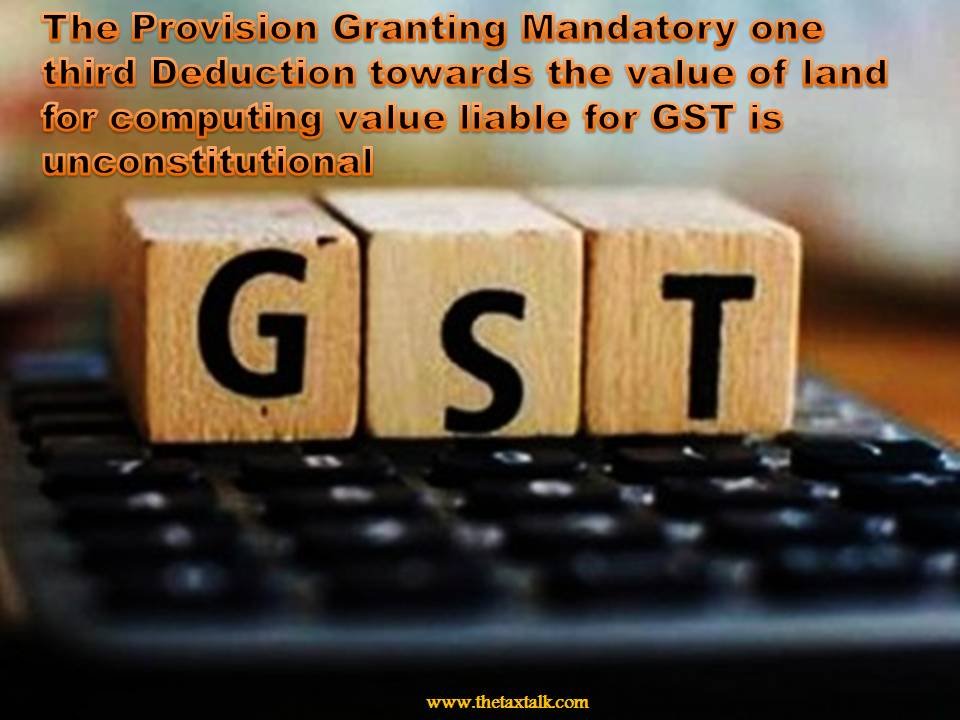![]()
The Provision Granting Mandatory one third Deduction towards the value of land for computing value liable for GST is unconstitutional
Under GST law in India, GST is applicable on purchase of under-construction real estate.
It may be noted that the GST is leviable on the entire contract value minus the value of land. However, there is a mandatory deeming fiction which provides that 1/3rd of the total amount charged as attributable towards sale of land, irrespective of the actual value of land.
The constitutional validity of this deeming fiction has been challenged in multiple High Courts Finally, the Gujarat High Court (HC) has come out with the first judgment in this regard in favour of the taxpayers. Gujarat High Court held that the provision granting mandatory one third deduction towards the value of land for computing value liable for GST in case of purchase of under construction property as unconstitutional. It hold that such mandatory deduction is not sustainable in cases where the value of land is clearly ascertainable or where the value of the construction service can be derived with the aid of valuation rules. Where such values are not available, such mandatory one third deduction towards the value of land can still be availed.
Here are the key observations/ conclusions from this judgment.
- The court have held that it is ultra-vires the provisions as well as the scheme of the GST Act
- It appears that separate and distinct consideration was agreed upon between the parties to the agreement for (i) the sale of land and (ii) construction of a bungalow on the land.
- As a result of the impugned GST notification, the entire consideration towards the sale of land has not been excluded for the purpose of computing tax liability under the GST Acts.
- 1/3rdof the total consideration has been deemed to be land value as per paragraph 2.
- In such circumstances referred to above, the writ applicant was filed before the Gujarat High Court with following submission:a) Gave the following illustrations to demonstrate how the impugned notification could be said to be ultra-vires the provisions of the GST Acts: “If the consideration for sale of land is Rs.85/- and for construction is Rs.15/- (approximately as in the present case);b) As per the provisions of the Act
On Rs.85/- GST would not be applicable and on the consideration for construction of Rs.15/-, 18% GST would come to Rs.2.70/-.c) However, as per Notification, the working would be as under:
Rs.85 + Rs.15 = Rs.100, Less Rs.33 (1/3rd treated as deemed value of land) = Rs.67 GST @ 18% = Rs.12.06.d) It was argued out that the tax liability by virtue of deeming fiction by way of delegated legislation far exceeds the tax liability as computed in accordance with the provisions of the statute which is otherwise impermissible.
- The court has held that the provision is ultra-vires vis a vis the provisions as well as the scheme of the GST Act.
- Hon’ble HC, Gujarat has read down the Sl. No. 2 of NN. 11/2017- CT (R) dt. 28.06.2017 (“Services Rate Notification”) to hold that mandatory 1/3rd deduction of land as ultra vires, stating that such standard deduction can only be optional and not mandatory.
- It held that it will be only available at the option of a taxable person where the actual value of land / undivided share in land is not available.
- In Shot, the Gujarat HC has held that when the actual land portion of value is determinable, the 1/3 deduction is not enforceable. Now, the biggest issue could be going to the Supreme Court by the department or else moving a retrospective amendment.
- The court allowed refund of differential tax along with interest to the petitioner, who was recipient of services and had borne the incidence of GST.
The copy of the order is as under:

